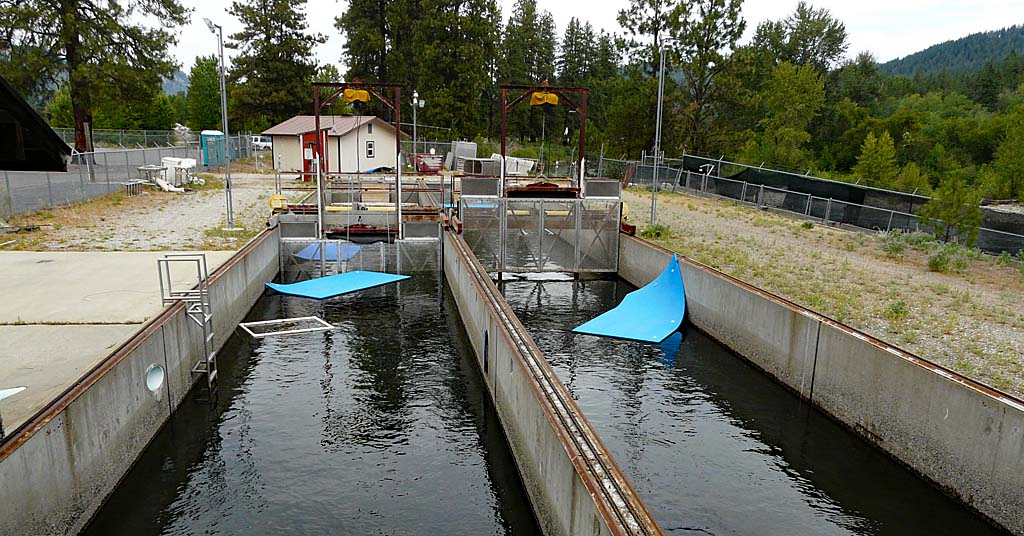Advocates: Washington’s child care crisis threatens families, economy
Published 5:00 am Friday, August 4, 2023

- Owner Angel Comacho stands with some of the children from Little Angels Bio-Dome Daycare & Pre-School, Walla Walla, for a Legislator Education and Action Project event Wednesday, Aug. 2, 2023.
Walla Walla — Washington’s workforce is in trouble as it faces a shortage of affordable and accessible child care.
That’s what Amy Anderson, director of government affairs for the Association of Washington Business Institute, said Wednesday, Aug. 2, at Little Angels Bio-Dome Daycare & Pre-School in Walla Walla.
Trending
The Association of Washington Business Institute is Washington’s oldest and largest statewide business association with almost 7,000 members representing 700,000 employees.
“We want everybody to know about child care,” Anderson said. “It really is a local issue with local solutions.”
As part of the Legislator Education and Action Project — or LEAP — an initiative jointly organized by AWB and the Children’s Campaign Fund Action, Anderson and other AWB members have been touring the state to educate newly elected state legislators and interested individuals about the pressing child care policy issue.
Walla Walla was not the first stop on the LEAP Tour, which began July 31, in the Puget Sound region.
Local outlook
Community leaders and members were invited to discuss affordable and accessible child care with members of the AWB. As the conversation progressed, it became clear that Walla Walla and its surrounding areas are lacking in high-quality, affordable child care options.
Trending
Angel Comacho, director for Little Angels Bio-Dome Daycare & Pre-School, addressed the crowd of parents, area business leaders as well as AWB and Children’s Campaign Fund Action representatives. The day care and preschool are centered on STEM and Montessori-inspired education.
She said the problems the child care sector is facing, particularly private entities, could be boiled down to a few key points, which are choice, wages and limitations.
“Having the choice in child care is important to all,” Comacho said. “Why is choice important? We need to be inspired in learning and diverse in our future’s leaders.”
Wages for child care providers are another issue Comacho talked about. “In the private sector, the ability to compete in the workforce is useless and a lot of times discouraging,” Comacho said. “Our employees are required to have degrees within five years, or they are turned over.”
This alludes to the issue of limitations within the child care system as well. The business-related barriers to become a child care provider are high, which adds to layers of paperwork, licensing and requirements.
“Adding standards on top of standards is not the way to go,” Comacho said. “It is not going to open and continue to provide choice and child care that we need within our region, our community and our state.”
Eiledon McClellan, director of the Walla Walla Valley Early Learning Coalition, said people who are looking for care for children under 5 are met with multiple hurdles to get over.
“The relationship between working and finding affordable child care has become more and more apparent throughout the past years,” McClellan said. “People used to be able to keep work and home life separate, but now there are so many who cannot come into work because there’s no one to watch the kids.”
From there, a trickle-down effect ensues. Without work and the cost of child care skyrocketing, people are not able to afford it, let alone even find child care. She said this is a particular problem in the Walla Walla Valley.
”What’s unique about Walla Walla is that we are the biggest small city in a one-hour radius so people in cities like Prescott, Dayton and Starbuck are coming to Walla Walla to work,” McClellan said. “They also do not have the resources in their home communities for child care, so they look at Walla Walla, which is also lacking options.”
She said the region is lacking care for infants and toddlers in particular.
”I think early learning and child care is really an essential service,” she said. “Without it, people cannot be productive members of the local workforce and economy.”
Cracks in the system
Staff shortages and low wages are what a July 2021 survey by the National Association for the Education of Young Children found to be responsible for the current challenges the child care sector faces. This echos what Comacho said during her discussion about what must change to make child care accessible. The survey suggests that 4 out of 5 child care providers are experiencing a staffing shortage, and 78% of the respondents considered wages the primary recruitment challenge.
The lack of child care goes beyond families but has hit employers and the economy hard as well.
According to a 2019 report by the Washington Child Care Collaborative Task Force, the lack of child care costs the state economy more than $2 billion per year in employee turnover or missed work and costs the state more than $6.5 billion per year.
“Parents should be able to get great care with intention without having to pay their months’ salary,” Comacho said. “This is unsustainable, not only for child care professionals, not only for the parents, but it is unsuccessful for our students.”









